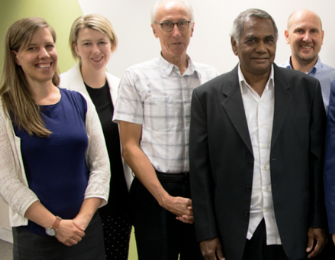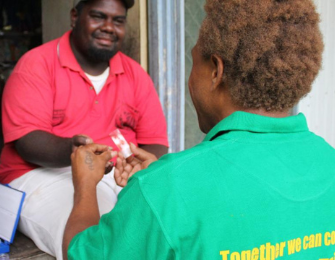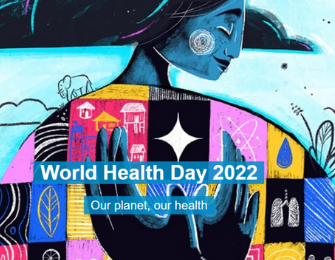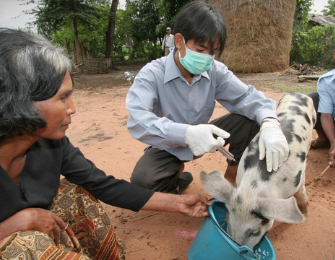
Former Director-General of the Pacific Community (SPC) and now Board member of the Asia-Pacific Leaders Malaria Alliance (APLMA), Dr Jimmie Rodgers, is heading up the Indo-Pacific Centre for Health Security’s (IPCHS) high-level scoping mission to Papua New Guinea and several Pacific island countries.
Prior to his team’s first mission, to Samoa and Solomon Islands from 22 to 28 March, Dr Rodgers visited Canberra for briefings with Australia’s Ambassador for Regional Health Security, Blair Exell, and a range of Australian government agencies. Exell said, ‘Papua New Guinea and the Pacific island countries have fragile health systems that can struggle to meet the challenges of providing routine immunisation coverage, controlling endemic infectious diseases like malaria and tuberculosis, and addressing non-communicable diseases.
‘This makes it all the more important that they are able to detect and contain emerging infectious disease outbreaks as close as possible to their sources.’ IPCHS is undertaking two high-level scoping studies, one to Papua New Guinea and the Pacific island countries and one to Southeast Asia, in order to develop options for programs of health security assistance at the country and regional level.
The scoping teams will consult widely with partner government agencies, regional and international organisations and other key actors in regional health security. Technical specialists within the Papua New Guinea and Pacific scoping team are Dr Robert Condon, a public health physician, and Dr Allison Imrie, a laboratory specialist. Dr Condon is also member of IPCHS’s Technical Reference Group.
The team will visit Samoa, Solomon Islands, Papua New Guinea and Fiji in March and April 2018, and will also consult with heads of Pacific health ministries in the margins of the Pacific Community’s Sixth Heads of Health Meeting in Nadi, Fiji.
Following their regional consultations, the scoping team will make recommendations on how best to match countries’ needs with Australia’s strengths in health security. These recommendations will inform the selection and design of key interventions for implementation in the 2018-2022 period.
Dr Rodgers said, ‘Australia’s Health Security Initiative provides an opportunity to strengthen countries’ preparedness to deal with emerging infectious disease outbreaks, and at the same time to address a range of endemic communicable disease burdens and strengthen health systems. ‘As we know from the spread of Zika across the Pacific, no country is too remote to feel the effects of emerging infectious diseases.’
The $300 million Health Security Initiative for the Indo-Pacific region was launched in October 2017 by the Minister for Foreign Affairs, Julie Bishop. Approximately one-third of the Initiative’s resources will be allocated to country- and regional-level programs in Asia and the Pacific.




